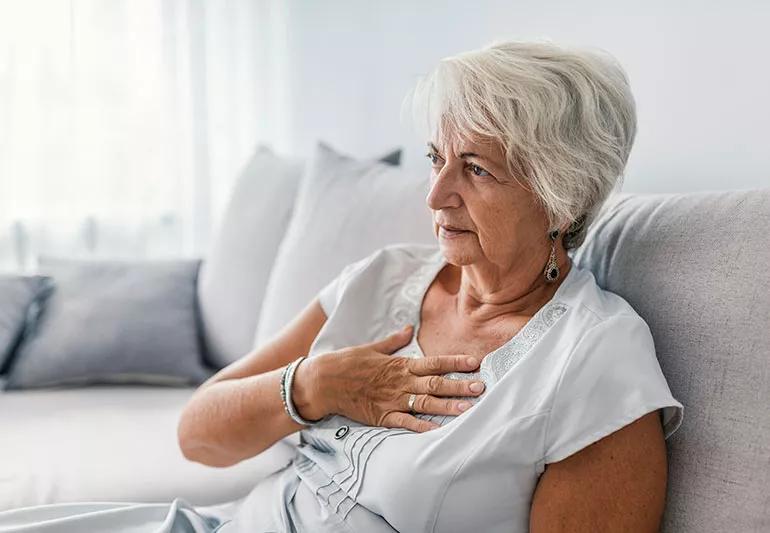Don’t delay in calling 911

Image content: This image is available to view online.
View image online (https://assets.clevelandclinic.org/transform/a0c94885-0118-4bc8-a379-5d1a77c8aea3/HeartAttack-997797726-770x533-1_jpg)
Concerned individual sitting on a couch with their hand to their chest
If you or someone you love experiences the telltale symptoms of a heart attack, you should get to the emergency room as soon as possible. Don’t delay. It could mean a better recovery and quality of life for the future, not to mention, the difference between life and death.
Advertisement
Cleveland Clinic is a non-profit academic medical center. Advertising on our site helps support our mission. We do not endorse non-Cleveland Clinic products or services. Policy
The Centers for Disease Control and Prevention (CDC) shares that “Every year, about 805,000 Americans have a heart attack and of these, 605,000 are a first heart attack.” This is why it’s important to have a plan of action in place when symptoms become noticeable.
“Survival depends on recognizing the symptoms and taking immediate action,” says cardiologist John Mansour, MD. “There is no time to waste when it comes to a heart attack.”
“You can’t predict when a heart attack will happen, to you, or to a loved one, but there are proactive steps you can take to be ready,” says Dr. Mansour.
Understanding and paying attention to risk factors for a heart attack is the first step.
“The first step in preparation is prevention,” says. Dr. Mansour. “Most people are aware that if they live an unhealthy lifestyle, their chances of a heart attack are greater.”
Stop smoking. Start eating healthier and implementing regular exercise into your daily routine, he says. “In terms of exercise, the biggest benefit comes when you go from doing nothing to doing something — even if it’s just walking. You don’t have to run a marathon to make your heart healthier.
“It’s also important to monitor your heart health on a regular basis, especially if you have a family history of heart disease,” he adds. Knowing that heart disease runs in your family could give you a leg up in preparation for a heart attack and for future recovery.
Advertisement
It may not be realistic to get to the emergency room within a few minutes of experiencing heart attack symptoms, but it is critical to take immediate action.
“When you don’t call 911 immediately or get to the hospital quickly, you risk death. Time is muscle. The longer you wait, the more damage is done to your heart,” Dr. Mansour says.
Surprisingly, many people delay in calling 911 for these reasons:
Many patients — more than 25% — wait more than six hours to go to the emergency room after symptoms begin. Don’t add to this statistic!
Video content: This video is available to watch online.
View video online (https://www.youtube.com/embed/s78vlbxQoFk?si=nnfpTPJj8X9PFI87)
YouTube video player
Symptoms will vary from person to person, but these are the most common symptoms of a heart attack to watch out for:
Symptoms also vary by gender. Many women don’t experience chest pain at all — only neck, jaw or back pain, among other symptoms. “Women usually wait four times longer than men to go to the emergency room because they don’t feel any chest pain,” says Dr. Mansour.
Any symptoms listed above should never be ignored. Even if you are not having a heart attack, it’s better to be safe than sorry and call 911. Your best chance of survival depends on how quickly you and your loved ones act.
Advertisement

Delivered every Tuesday!
Sign up for our Health Essentials emails for expert guidance on nutrition, fitness, sleep, skin care and more
It's a letter about the news!
Learn more about our editorial process.
Advertisement
Most recommended precautions center around minimizing bruising or swelling
Even one drink can have an impact on your cognitive function leading to slurred speech, blurred vision and impaired memory
Understand who may (and may not) benefit
Lorem ipsum dolor sit amet. Et odio Quis vel ipsam omnis eum alias deleniti et placeat impedit non voluptas galisum hic autem enim et cupiditate aliquid. Est beatae quidem non facilis autem ut commodi nisi aut tempore rerum et dolores voluptatem cum enim optio id sapiente quasi. Ad laboriosam officiis 33 cupiditate sequi ea voluptatum consectetur qui necessitatibus voluptate et quasi doloremque et facere explicabo quo explicabo officia
Seeking help through therapy can be an important step in improving your quality of life when you have UC
Type 2 diabetes isn’t inevitable with these dietary changes
Applying a hot or cold compress can help with pain
Pump up your iron intake with foods like tuna, tofu and turkey